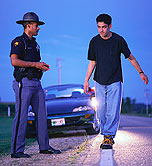- 8 Ways to Increase Dopamine Naturally
- 7 Best Breads for Maintaining Stable Blood Sugar
- Gelatin vs. Collagen: Which is Best for Skin, Nails, and Joints?
- The Long-Term Effects of Daily Turmeric Supplements on Liver Health
- Could Your Grocery Store Meat Be Causing Recurring UTIs?
- Are You Making This Expensive Thermostat Error This Winter?
- Recognizing the Signs of Hypothyroidism
- 10 Strategies to Overcome Insomnia
- Could Artificial Sweeteners Be Aging the Brain Faster?
- Techniques for Soothing Your Nervous System
Cops on Night Shift at Higher Risk of Serious Injury: Study


Late-night police work is dangerous business: New research finds that cops who work the night shift are two to three times more likely than others to suffer job injuries that cause lasting damage.
The study tracked shift schedules, stress levels and leave for injuries among more than 400 Buffalo, N.Y.-based police officers from 1994 to 2009. The researchers found that 10 percent of officers who worked night shifts (11 p.m. to 8 a.m.) suffered from injuries that put them on leave for longer than 90 days.
“Leaves of this length suggest more serious types of injury and indicate that night-shift work poses a more significant threat to the life and health of officers than previously assumed,” said epidemiologist John Violanti, principal author of the study and a research scientist with the University at Buffalo Department of Social and Preventive Medicine.
“The study results also point to the problems long-term injuries provoke for police managers, as long injury absences put a strain on police personnel who must cover for the injured officers,” Violanti said in a university news release. “This could lead to health problems for them as well.”
After adjusting their statistics for factors such as age and gender, the researchers found that rates of long-term injuries for night-shift workers were three times higher than for day-shift workers and twice those of afternoon-shift workers.
Why might the night-shift injury rates be so high? “Sleep disturbance and fatigue-related impairment provoked by circadian disruption have been reported in previous studies of night-shift workers,” Violanti said. “[These factors] have been found to affect the kind of decision-making that is required in fast-paced, ambiguous, high-risk police situations.”
“Evening and night police shifts are inherently more active than day shifts too,” Violanti said. “Not only do more crimes occur during these hours, but the calls for service are generally more hazardous and more frequent, which could result in more serious injuries.”
The study was published recently in the Scandinavian Journal of Work and Environmental Health.
More information
For more about sleep and health, see the U.S. National Institutes of Health.
Source: HealthDay
Copyright © 2026 HealthDay. All rights reserved.










